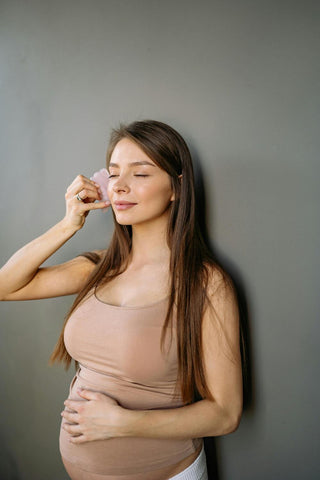Pregnancy Acne: Why It Happens & How to Get Rid of It
Pregnancy is such a blessed and magical time in a woman’s life. It makes you glow with anticipation and makes you feel oh so dreamy! But sometimes it involves dealing...
Pregnancy is such a blessed and magical time in a woman’s life. It makes you glow with anticipation and makes you feel oh so dreamy! But sometimes it involves dealing...


Pregnancy hormones can cause the sebaceous glands to go into overdrive. This causes your skin to produce more oil and gives a shiny appearance to the skin.
Acne during pregnancy can also be caused by excess oil production. It can clog pores, and leads to the formation of blackheads and whiteheads. In case of any bacterial infection, skin inflammation can also occur which can lead to the development of pimples.
While facial acne during pregnancy is most common, it can also occur on different areas of the body such as the chest, back, and shoulders. These areas have more oil glands.
Hormonal fluctuations can make the skin more sensitive and prone to inflammation. This can aggregate various acne symptoms.
These are some different types of acne during pregnancy:
This type of acne entails the presence of blackheads and whiteheads. Blackheads occur when pores are partially blocked, whereas whiteheads occur when pores are completely blocked by oil and skin cells.
Inflammatory acne involves red, swollen pimples that are often tender to the touch. These pimples result from bacteria-infused inflammation.
This is a severe form of acne during pregnancy. It consists of deep, painful, and often large nodules or cysts beneath the skin's surface. It can lead to scarring and therefore, if you are suffering from cystic acne, we suggest you solicit medical intervention.
Hormonal fluctuations during pregnancy can contribute to hormonal acne which is often seen along the jawline, chin, and cheeks.
If you are wondering about how to prevent pimples during pregnancy, we have listed natural remedies for your reference:
Use a gentle cleanser to wash your face. You can do it twice a day to remove excess oil, dirt, and bacteria without taking away your skin's natural oils.
Dilute apple cider vinegar with water in the ratio of 1 is to 3 and use it as a toner after cleansing. It will help in balancing your skin’s pH and reduce bacteria that can cause acne. Having said that, it would be a good idea to do a patch test or ask your dermatologist before using this toner on your skin.
You can use pure aloe vera gel to soothe acne spots. Aloe vera has anti-inflammatory and skin-healing properties that can calm pregnancy acne.
Do not use chemical-based skincare products, as they may not be safe for you and the baby during pregnancy. It is a good practice to always check out the list of ingredients of your skin care products before choosing something for your self-care regime.
Besides consuming a balanced diet rich in fruits, vegetables, and whole grains, you must also drink plenty of water to keep your skin hydrated. Furthermore, avoid excessive consumption of sugary or processed foods.
Stress can aggravate acne. Through relaxation techniques like deep breathing, meditation, or prenatal yoga you can manage stress levels and consequently handle acne as well.
While talking about acne during pregnancy, it is important to remember that, pregnancy acne is a temporary phase, which is likely to improve post-childbirth. While it lasts, you can embrace a proper skincare routine, stay hydrated, and seek advice from your healthcare provider to help you manage and reduce pregnancy acne effectively. So, kindle that mom-to-be spirit, and don't let a few blemishes dull your pregnancy vibe! And, while you are at it, you can explore the amazing range of self care maternity products, maternity wear and kidswear on The Mom Store and choose garments & accessories that best appeal to your personal style and comfort aspirations.
To prevent pimples during pregnancy, you can
The duration and severity of pregnancy acne can vary from person to person. For some women, it may persist throughout the pregnancy while for others it may get better as you go
along your pregnancy journey. Since hormonal changes influence acne, it's essential to address this issue and consult a dermatologist for personalized advice.
Acne is not a definitive sign of pregnancy. However, some women may notice changes in their skin, such as acne, due to hormonal fluctuations that are one of the most common signs of pregnancy.
Your cart is currently empty. Start Shopping